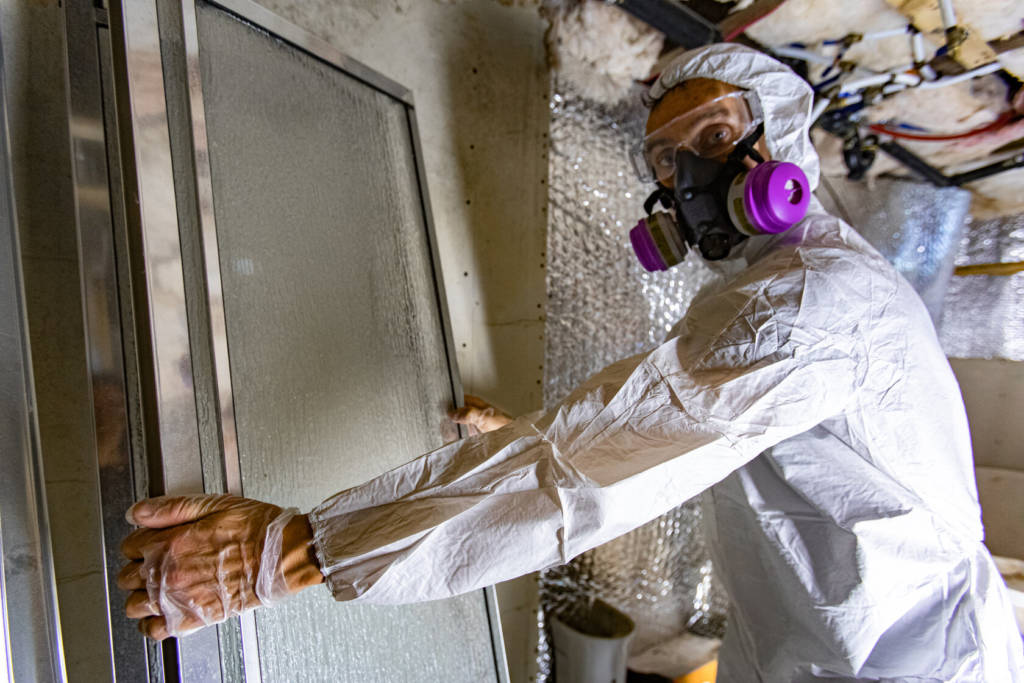What to Do if Mold Is Found in a Home Inspection

Buying a new home is an exciting, albeit stressful, process. It signifies a new chapter in life and homebuyers want to start that chapter off right. One of the most important parts of buying a home is conducting a home inspection. Typically, a home inspection consists of an in-depth examination of the home’s plumbing and electrical systems, roof, attic, walls, ceilings, floors, windows, doors, fireplaces, chimneys, and heating and central air. The inspector may also examine how the home’s insulated, identify any structural or drainage issues, and determine if there are any pest or rodent problems. This includes checking for mold.
The discovery of mold may be a deterrent for some buyers, especially if they have a compromised immune system, but should not be a deal breaker for most transactions. In this blog post, we explore some common mold scenarios you may encounter after a home inspection.
What Is Mold and Where Does It Come From?
Mold is a fungus that forms when excessive moisture is present. It’s commonly found in basements, attics, bathrooms, air ducts, and other places that are exposed to higher concentrations of moisture. Most types of molds are black, green, or gray. The most common types of mold types found in New England homes are:
- Aspergillus/Penicillium: Commonly referred to as ASP/PEN on a mold inspection report, this is the most common mold species to appear in indoor air samples. ASP/PEN spores are typically allergenic and not toxic but people with weakened immune systems may suffer from exposure, specifically, those with Lyme Disease and Asthma.
- Cladosporium: This type of mold is often found within the home, and in high concentrations can be harmful. This is the most common form found in attic mold situations.
- Stachybotrys Chartarum: Also known as black mold, this is a toxic type of growth that typically results from a continuous water leak over an extended period. Unlike other molds that only require high levels of humidity, this type of fungus requires 100% water saturation and constant moisture to thrive.
Learn more in our free guide “15 Questions to Ask Your Home Inspector”
10 Common Mold Scenarios and How to Fix Them
Here are 10 common mold scenarios that realtors can share with homebuyers, and that homebuyers should be aware of.
1. A small amount of mold is found during a home inspection. What happens next?
If mold is found during a home inspection, you’ll want to confer with your real estate agent for the best course of action. You can contact a mold remediation company for a removal cost quote.
Depending on how much mold is present and the state of the housing market, you can attempt to negotiate with the sellers. They can either take care of the mold themselves (with a company you recommend), or you can re-negotiate the price, considering the amount of money you’ll have to spend on the mold removal.
2. Mold is not on the disclosure, but it’s found during the home inspection. What now?
This means that the homeowners were most likely unaware of mold in their house. You and your real estate agent can discuss what to do, but this can change the negotiation terms and even the price of the home. Depending on the market, the sellers may subtract the cost of mold remediation from the price of the house.
3. You want to move in before any type of mold remediation. Is it safe?
It’s ideal to get any mold remediation complete before moving into a new home. If there is elevated mold spore activity, regardless of the species, it may not be safe to move in. However, if the area can be completely isolated then it may be safe to move in before the remediation is completed. We highly recommend consulting a mold inspector before moving in and scheduling remediation as soon as possible.
4. Your home inspector finds what they think is mold in the attic. How can I be sure?
If there is mold — or suspected mold — in the attic (or anywhere else in the home), you should consult with a certified mold inspector. Many times, the inspector may be able to confirm the presence using photos from the home inspection but sometimes the expert will conduct scientific air sampling or collect samples that will be analyzed in a lab.
5. Mold is found on the siding of the house.
Mold will grow due to high levels of moisture. Mold on the exterior is often found in damp areas or areas that don’t get a lot of sunlight. The discovery of exterior mold does not mean that there will be an elevated mold level on the inside of the home. The key to reduce the risk of indoor mold is to properly manage the humidity within the home. Ideally you will want to maintain 35-50% Relative Humidity (RH).
6. Mold is found during a home inspection and remediated. Should you be worried about any lingering health effects?
If the mold was removed by a reputable remediation company, and the source of the mold (the moisture) has been resolved, you shouldn’t have to worry about any lingering health effects. If the moisture that caused the mold in the first place is still a problem, there is a good chance the mold will return — along with possible adverse health problems. You should also research the remediation company used to make sure they are reputable. It’s most important to make sure that the mold and the source of the mold has been removed. The health effects are most dangerous if mold is currently in the house.
7. Black mold is found in the home.
If black mold is found in the home, a professional should be used to remove it properly and with minimal disturbance while containing the spores and mycotoxins and avoiding cross contamination. Black mold is highly toxic and must be removed in a timely manner.
8. There is a lot of mold, and a professional mold remediation company needs to remove it all before you can close the deal. How long will it take? What’s involved?
Your mold remediation time frame and cost will both depend on the location of the mold in your home and how much is present. Costs can range anywhere from $1,500 to $50,000 (for a complete house gut). The time frame is typically between a few days to a few weeks.
9. Your home inspector didn’t find any mold, but you think you might have a problem.
You should hire a certified mold inspector. This expert will conduct a thorough visual inspection of the home and conduct scientific air sampling and/or collect physical samples. The collected samples will be analyzed at a lab and the mold investigator will use this data to write a report.
10. The basement had mold remediated but is still susceptible to floods. Will mold grow back every time I have flooding? How can I prevent this?
Mold will not necessarily grow back if the basement floods again. If the basement is dried within 24 hours, then mold will not grow. If organic materials like drywall, cardboard, wood, and personal contents become impacted with water, they should be removed (if possible) and dried as quickly as possible. It’s important to keep an eye out for mold and make sure that any residual water after a flood is cleaned up in a timely manner. Mold thrives on moisture, so it’s essential to prevent and stop any leaks or water intrusion.
Resources and State Laws on Mold in Homes
Before hiring a mold remediation company, it’s important to be aware of available resources and state and federal laws concerning mold in residential homes. Here are some helpful resources for more information:
Federal
- Centers for Disease Control & Prevention
- Environmental Protection Agency
- National Institute of Environmental Health Sciences
State
New Hampshire
- New Hampshire Mold Legislation: SB125
- New Hampshire Department of Environmental Services
- New Hampshire Better Business Bureau Mold Removal
Maine
- Maine Department of Environmental Protection
- Maine Indoor Air Quality Council: All About Mold
- Maine Better Business Bureau Mold Removal
Massachusetts
- Executive Office of Health and Human Services
- Indoor Air Quality Program
- Mold, Moisture, and Mildew
- Massachusetts Better Business Bureau Mold Removal
Here are a few common certifications that mold remediation companies may hold or be affiliated with:
- American Council for Accredited Certification
- Indoor Air Quality Association
- Institute of Inspection Cleaning and Restoration Certification
- National Air Duct Cleaners Association
Questions About Mold? We Can Help!
We understand that a home will likely be the largest financial investment of your life, which means you want to make sure you do it right. As an industry leader with more than 35 years of award-winning experience, EnviroVantage specializes in indoor air quality (IAQ) improvements, mold remediation, asbestos abatement, duct cleaning, and more. We have helped thousands of buyers and sellers eliminate obstacles that were discovered during a home inspection — including mold.
If you have any questions, or you’re looking for a mold removal quote, contact us, and we’ll be in touch!

Are you ready to buy or sell your home?
Whether your offer has just been received or you’re thinking about putting your house up for sale, consider these 15 important questions to ask your home inspector.

Questions?
We’d be happy to answer them — and talk about how EnviroVantage can support your next abatement, demolition, or remediation project.